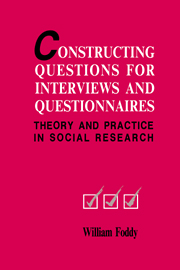Book contents
- Frontmatter
- Contents
- Tables
- Figures
- Preface
- Chapter 1 An initial statement of the problem
- Chapter 2 A theoretical framework
- Chapter 3 Defining topics properly
- Chapter 4 Formulating intelligible requests for information
- Chapter 5 Contextual influences on respondents' interpretations of questions
- Chapter 6 The need to provide response frameworks
- Chapter 7 The limitations of human memory
- Chapter 8 Filters: establishing the relevance of questions to respondents
- Chapter 9 Reducing question threat
- Chapter 10 The open vs. closed questions debate
- Chapter 11 Measuring attitudes
- Chapter 12 Checks to ensure that questions work as intended
- Chapter 13 Concluding comments
- The tap paradigm
- References
- Index
- Acknowledgements
Chapter 4 - Formulating intelligible requests for information
Published online by Cambridge University Press: 04 September 2009
- Frontmatter
- Contents
- Tables
- Figures
- Preface
- Chapter 1 An initial statement of the problem
- Chapter 2 A theoretical framework
- Chapter 3 Defining topics properly
- Chapter 4 Formulating intelligible requests for information
- Chapter 5 Contextual influences on respondents' interpretations of questions
- Chapter 6 The need to provide response frameworks
- Chapter 7 The limitations of human memory
- Chapter 8 Filters: establishing the relevance of questions to respondents
- Chapter 9 Reducing question threat
- Chapter 10 The open vs. closed questions debate
- Chapter 11 Measuring attitudes
- Chapter 12 Checks to ensure that questions work as intended
- Chapter 13 Concluding comments
- The tap paradigm
- References
- Index
- Acknowledgements
Summary
The last chapter dealt with the need for the researcher to begin with a clear definition of the topic and a clear idea of the information that is required about the topic. In this chapter, the focus will still be on the first step in the question–answer communication cycle, as we consider some of the problems the researcher has to confront when trying to formulate a request for the required information which will be understood by the respondent (see figure 4.1, p. 39).
In the past, social researchers have typically assumed that their questions would be understood by respondents as they are intended to be understood. But, just as it is often doubtful that researchers always have a clear idea of the information that should be collected, it is doubtful that respondents always understand what information the researcher wants.
If respondents are to understand a question as intended by the researcher, they must minimally give the same meaning to individual words and attribute the same overall meaning to the structural elements (i.e. component phrases, clauses, etc.) that make up the question. Both of these requirements involve a host of complexities that need to be discussed at length.
The meanings of individual words
Before respondents can interpret a question as the researcher wants, they must understand each word in the same way as the researcher understands it.
Information
- Type
- Chapter
- Information
- Constructing Questions for Interviews and QuestionnairesTheory and Practice in Social Research, pp. 38 - 51Publisher: Cambridge University PressPrint publication year: 1993
